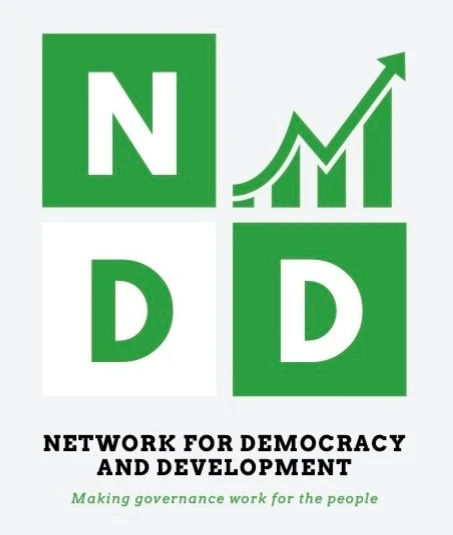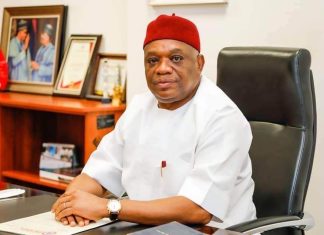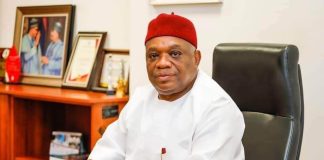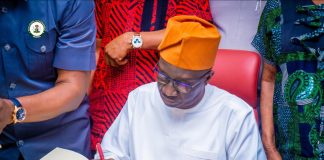. INTRODUCTION
The Network for Democracy and Development (NDD), a multi-stakeholder national platform, is committed to the promotion of ethical leadership and good governance in Nigeria.
In the wake of the activities marking another year in office by elected public officials across the country, the Network carried out an extensive engagement among its stakeholders on the state of governance in the past one year. Special attention was given to a few critical issues that affect us all.
This update is the first instalment as the Network has put in place mechanism for regular interventions on the state of governance in Nigeria.
*II. GENERAL STATE OF GOVERNANCE*
In the current scheme of things, little suggests that government at all levels is accountable to the people. Even with the provisions for separation of powers and checks and balances, it is difficult to single out any institution of government that is free of compromises.
While Nigerians pay close attention to the activities of the federal government, not much of life-transforming interventions is going on in most of the states that are closer to the citizens. Local governments which should champion community development are largely government only in name.
The National Assembly which should be the people’s parliament carries on its activities with scant regard for the citizens it represents. While major bills that could affect Nigerians in some fundamental ways are proposed by members of parliament, the people are made to watch the debates from the sidelines.
For instance, there is no evidence to suggest that bills on state police, return to parliamentary system of government, change of the national anthem and creation of new states which may require constitutional amendments emerged from an intensive process of stakeholder engagement. For context, it is important to state that Nigerians, the true sovereigns, need not wait until the parliament organises public hearings before they can have a say on these critical issues.
The media which should set agenda for discourses on issues of national importance and the nation’s cultural and religious leaders who should serve as moral voices seem to be overwhelmed by the current state of things.
*_NDD holds the firm belief that impunity, not corruption, is the greatest challenge that we currently face as a nation._*
*III. SECURITY*
The Network salutes the patriots in the security services for their uncommon sacrifices to keep Nigeria and Nigerians safe. We acknowledge their unrelenting efforts to take the battle to the criminal elements who ravage our communities across the country.
There is a general perception that security has marginally improved across the country in recent months. However, this is not backed by any empirical data. Perception can be misleading: while Nigerians, torn between hope and fear, might have adjusted to the sad reality and go about their activities, the true state of things may be underreported by the media.
What is incontrovertible is the sad fact that the security challenges that the current set of leaders inherited last year have not gone away. Many farmers in different parts of the country have abandoned their farms as a result of insecurity. Bandits and kidnappers still strike on highways, in schools and in towns and cities. Not much has been done to deal with financiers as well as external forces who fuel terrorism and other criminal activities in Nigeria. What’s more, many high profile suspects have found a way to circumvent the legal system.
We have observed that the perennial concern about poor synergy among security agencies subsists. This challenge is further complicated by lack of a well-coordinated strategy to manage the security sector. More often than, the occasional successes that our brave men and women in uniform achieve were products of reactionary tactics rather than well-articulated and well-coordinated proactive strategy.
The Network is keenly following the debate on state police. While we believe that Nigeria is grossly under-policed, we, however, advise that political leaders should consider other options under the current circumstances. Massive recruitment of new police personnel who may be deployed to their states of origin or residence by the Nigeria Police Force as well as the decentralisation of the management and funding of the service are cost effective and less politically explosive options. Besides, there should be more investment in intelligence gathering and technology to strengthen the security system.
*IV. ECONOMY*
The President has shown capacity to take bold decisions in order to take the country out of socio-economic doldrums. His direct involvement in the driving of the economic policies, continuity with projects inherited from the last administration and the opening of new frontiers at both local and global levels are quite commendable.
While it is unarguable that Nigeria’s economy has experienced a long spell of instability, the Network believes that the manner by which the President removed fuel subsidy during his inaugural address on May 29 last year is at the root of the current economic challenges. Long before May 29 last year, there was a convergence of opinion among well-informed Nigerians that the government needed to take some drastic measures to review the subsidy regime.
However, as we noted in our press statement on the subject on June 7, 2023, there was “inadequate consultation with stakeholders prior to the declaration of the removal of fuel subsidy”, “the root causes of the problem were not addressed while mitigating measures were not articulated”.
The cocktail of economic policies that followed this proclamation has thrown Nigeria into a new era of high inflation. Naira is devalued at an unprecedented rate. Cost of living has risen drastically. Cost of doing business is becoming unbearable. Income inequality has widened. Real disposable income has declined. Labour productivity has taken a massive hit as people have to deal with existential challenges.
The statistics that are available in the public space, including those published by relevant government agencies, especially the National Bureau of Statistics, are in the main concerning.
The palliative measures which were meant to mitigate the effects of fuel subsidy removal and floatation of the Naira were poorly structured, poorly deployed and poorly managed across the country.
The Network is concerned that, so far, the federal government’s economic policies are not coherently managed. The one day, one policy of surprises and suspense is unhealthy for a fragile economy like ours. More significantly, there is little to show that these policies are delivering tangible improvements in the living conditions of citizens. Even when citizens groan about their worsening conditions, government has not shown enough sensitivity with the new regime of tariffs that it throws at them.
The primary responsibility of government is the welfare and security of the people. While we recognise the enormous challenges that our leaders face, above all else, a simple yet fundamental question that government at all levels should ask is this: *has the quality of life of Nigerians improved in the last one year?* All other performance metrics fall within the realm of details.
*V. GENERAL RECOMMENDATIONS*
The Network calls on the Federal Government to:
1. Review its economic policies towards making life more liveable for citizens; only the living can enjoy the full benefits of reforms.
2. Develop coherent national economic policy and security strategy.
3. Expand the scope of engagement with Nigerians on planned polices before they are announced and implemented.
4. Enthrone a rigorous vetting process before policies and legislations are approved by the President.
5. Review the governing team to ensure an efficient management of the affairs of the nation; there must be an immediate end to the flip flops in government’s decisions that we have witnessed in the last one year.
6. Develop a new national productivity policy that would put the majority of Nigerians to work in whatever sectors they choose to operate.
7. Push through its decision to achieve financial autonomy for local governments; however, this should go hand in hand with a new mechanism for ensuring transparency and accountability in governance at all levels.
8. Conclude negotiation on a new minimum wage within the shortest time possible.
9. Ensure an efficient management of the student loan scheme and other economic interventions.
10. Make available to Nigerians the metrics that the office of the Special Adviser to the President on policy coordination uses to assess the performance of government officials and their respective MDAs.
11. Work in concert with other tiers of government and strategic stakeholder groups to develop measures that would bolster citizens’ confidence in democracy as a beneficial system of government.
*VI. CLOSING THOUGHTS*
The Network urges the organised civil society to develop a comprehensive, evidence-based national framework for governance performance review to complement the efforts of the government. NDD, in conjunction with our collaborating organisations, shall commit resources to this important civic responsibility.
God bless Nigeria!
*Tajudeen Alabede*,
_National Coordinator_
*Muhammad Jameel Muhammad*,
_General Secretary_
*Email*:
ndd.nig@gmail.com
Share your story or advertise with us: Whatsapp: +2347068606071 Email: info@newspotng.com

















